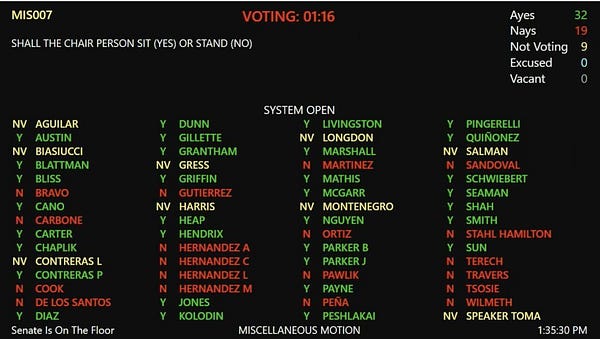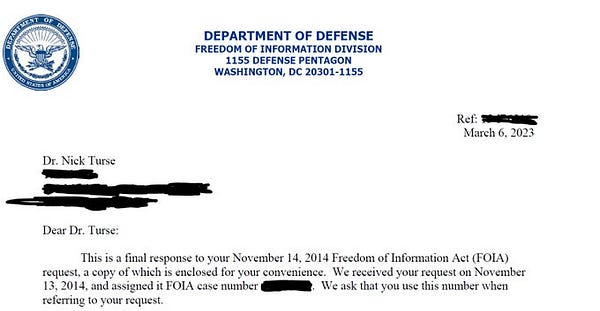The Daily Agenda: Take it to the voters
It's going to be a busy 2024 ... When a censure fails, go for the ethics complaint ... And if only we could afford a large sailboat.
Your ballot might be more crowded next year.
Astute observer Nelson Morgan wrote an op-ed for the Republic this week after noticing more policy ideas GOP lawmakers are trying to send directly to the ballot to circumvent potential vetoes from Gov. Katie Hobbs.
We wanted to further explain how lawmakers can refer questions to the ballot, why it matters and what we’re seeing now.
You’ve heard of bills that move through the Legislature. Those require approval from both chambers and a signature from the governor to become law. But there are a few other types of legislation1:
Concurrent resolutions (HCRs or SCRs): Both chambers need to approve these resolutions, which can be benign or substantial. Some note a special recognition for a person or group, while others send measures to the ballot for voters to weigh. The governor plays no role.
Simple resolutions (HRs or SRs): A simple resolution is basically an opinion from one chamber that doesn't require the governor’s signature.
Memorials (HMs or SMs): Essentially, these are letters sent to the feds asking them nicely to act on something. The federal government does not have to listen or answer.
The concurrent resolutions are what matters most here. Lawmakers use concurrent resolutions to initiate changes to the Arizona Constitution or to change anything that previously was enacted by voters and subject to the Voter Protection Act. Or they sometimes just want to get around the governor.
On last year’s ballot, eight of the 10 ballot measures came from legislative referrals. Two were citizen’s initiatives, a process the Legislature has repeatedly made more difficult which now costs many millions for a successful campaign.
This year’s proposed ballot referrals include massive restrictions to mail-in voting, a prohibition on any consideration of race or ethnicity in hiring and a limit to governor’s emergency powers. One would put a holdover budget in place if there’s no new budget approved. Others would change the Arizona Constitution to include a parental bill of rights and to require 60% approval of ballot measures. Several limit the rights of local governments to create charters or set council districts or tax people on the miles they travel in a car or regulate employee benefits.
Sen. J.D. Mesnard, who sponsored a couple of the referrals on last year’s ballot and has a few in the works now, said he’s not sure if there are more this year, especially when you consider how many of the proposals require voters’ approval because of constitutional changes.
But he thinks if Republican bills largely get vetoed this year, next year’s Legislature will for sure refer more stuff to voters directly. He hedged his bets in one instance, running both a bill and a concurrent resolution that would create an income tax cut after a budget surplus, just in case the bill gets vetoed.
“I would just admit freely that if we send up the bill and she vetoes the bill, the SCR is the only other option,” Mesnard said. “By putting both out there, I was just trying to keep all my options on the table.”
Both chambers still need to approve resolutions before voters would get a chance to decide on them. Any concurrent resolutions that send a question to the ballot this year, as well as next year, will go on 2024’s ballot, which also includes a presidential contest where Arizona will play a key role.
Voters tend to default to voting no on ballot measures, meaning lawmakers and their allies usually have to spend money on convincing them to vote in favor of these ideas.
Lawmakers will potentially leave a bunch of major policy decisions directly in the hands of voters, who will face a long, complicated ballot in a year that’s sure to be insanely expensive.
Will there be consequences?: After first trying to censure Republican Rep. Liz Harris on the House floor, Democratic Rep. Stephanie Stahl Hamilton filed an ethics complaint against the lawmaker after Harris invited a woman to an election hearing who shared bonkers conspiracy theories that maligned some elected officials. Stahl Hamilton’s attempt at a censure was blocked by Republican leadership, and it’s unclear how the ethics complaint will fare, the Republic’s Ray Stern reports.
Another Cochise lawsuit: Attorney General Kris Mayes sued Cochise County yesterday over supervisors’ decision to outsource election duties to the County Recorder David Stevens, who the board made interim elections director. Mayes called the change of duties an “unqualified handover” that “steps far over the legal line” and could hide from public view some aspects of elections.

A clash of egos: Former President Donald Trump, who’s running again in 2024, is eyeing a female running mate, Axios’ Mike Allen reports. Trump apparently considers Kari Lake to be the “model for his vice presidential pick,” though Lake could steal the spotlight from the egocentric Trump and comes with the baggage of her losing gubernatorial bid.
Rest in peace: Jack Chee Jackson Sr., a longtime Democratic state lawmaker who represented the Navajo Nation area, died on Sunday at age 90.
Life and death: After a U.S. Supreme Court ruling in favor of John Cruz, a death row inmate who argued successfully that jurors should’ve been told a life sentence had no parole option in his case, six additional cases will go back to trial courts here based on the decision, the Republic’s Jimmy Jenkins reports.


Not that Bill Gates: Maricopa County Supervisor Bill Gates got the full profile treatment in the Atlantic, where writer Barton Gellman examines how being in the middle of constant election-denying turmoil has affected the politician in his work and daily life.
But would voters agree?: Conservative Substacker Robert Robb calls Sen. J.D. Mesnard’s plan to ask voters to approve a backstop budget if lawmakers and a governor can’t agree in time a “good idea” because the threat of a government shutdown can be wielded by both sides in a way that’s dangerous for state operations.
Unexpectedly aligned: Two lawsuits filed by very different groups allege the City of Phoenix violated the law by entering into contract negotiations with its police union before the public saw any drafts of any contract proposals, the Phoenix New Times’ Katya Schwenk reports. Poder in Action, a left-leaning nonprofit focused on policing, and the Goldwater Institute, the conservative think tank, filed separate suits against the city.


Mobile home exodus: As residents in three Phoenix mobile home parks face potential evictions, the Phoenix City Council is trying to find ways to stop development in these areas or provide money for people who could be displaced, KJZZ’s Christina Estes reports. But a state law would require the city to pay for a diminished property value if the council tries to designate the parks as for mobile homes only.
Sorry, Spot: Pet groomers aren’t licensed or regulated in Arizona or in other states, giving pet owners who have negative experiences or whose pets get injured little recourse to hold a groomer accountable, the Arizona Mirror’s Jerod MacDonald-Evoy reports. Groomers can opt into certification programs, but there’s no industry standard.
Solutions story: The Arizona Luminaria’s Beatriz Limón highlights an Arizona State University program that trains teachers on multilingual education in hopes of improving the state’s ongoing teacher retention problems and helping multilingual students in the classroom.


Something that works: A program that provides services, like parenting and employment classes, to people leaving prison could be extended under House Bill 2615, University of Arizona Bolles Fellow Isabela Gamez reports. The program, which is currently capped at 90 days, has seen its participants’ recidivism rates drop by 60%.
Charlie Kirk will probably go to the next board meeting: After a new governing board member at the Chandler Unified School District attended a student meeting of Turning Point USA at Perry High School in Chandler parents to call on the board to disavow Turning Point, though the district can’t remove a student-led group from campuses, the Daily Independent’s Jason W. Brooks reports.
On the critter beat: The Nogales International’s Angela Gervasi follows along with some prairie dog volunteers who work as part of the Arizona Game and Fish Department’s efforts to reintroduce prairie dogs into southern Arizona’s Las Cienegas National Conservation Area.
“It just started pooping everywhere. It was not happy,” one volunteer said of a prairie dog. “They’re feisty. They’re fun.”





